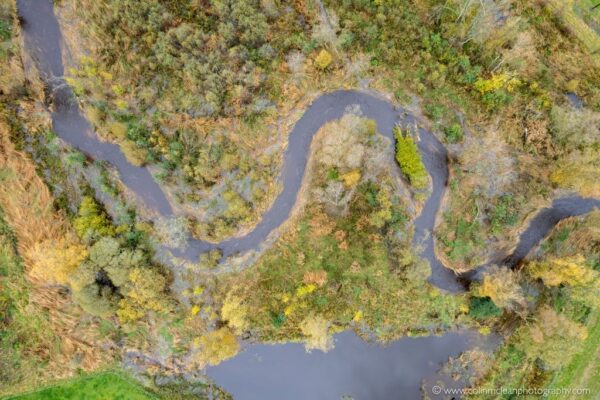A flood resilience and biodiversity project developed by Scottish Borders environmental charity Tweed Forum at Eddleston Water near Peebles has gained global significance by being chosen as a UNESCO Ecohydrology Demonstration Site – the only one in the UK.
The Eddleston Water Project is a living laboratory that is collecting evidence of the benefits of Natural Flood Management techniques. These aim to enhance flood resilience through the restoration of natural processes that slow water flows and, increase the amount of water stored in the landscape. This will help reduce the risk of flooding to communities downstream, providing adaptation to climate change, while simultaneously also improving the biodiversity of the river catchment.
Measures implemented across the 69km2 Eddleston Water catchment include the creation of 38 new ponds to catch surface water flow and hold water back, and the re-meandering of some 3.5km of once-straightened river channels. Over 330,000 native trees have also been planted across the catchment. As well as having a positive impact on ecology and sequestering carbon, in time these will also aid water infiltration in upstream areas where floods are generated and will help to slow overland water flows.
Photo: Colin McLean / Tweed Forum
Reduced peak water levels
Results to date have shown reduced peak water levels downstream during heavy rain as well as a delay of up to seven hours in the timing of river peaks, which gives people more time to prepare and take action. There has also been a rise in fish numbers due to increasing the channel length through re-meandering.
Luke Comins, Director, Tweed Forum said; “We’re delighted that this UNESCO recognition will enable us to continue to share the effectiveness of the nature-based solutions we’re implementing on a catchment scale both here and abroad.”
Professor Chris Spray, UNESCO Centre for Water Law, Policy and Science at the University of Dundee said; “The full results of the Eddleston Water project will take many years to deliver, but the benefits measured to date are already very exciting, from flood risk reduction to increased plant and wildlife biodiversity.”
Mairi McAllan, Scottish Government Minister for Environment and Land Reform said:
“This work shows the importance of natural flood management in reducing the risk from flooding downstream, as well as creating better habitats for many species.”
This is the second time that Tweed Forum’s work has been recognised by UNESCO. In 2009, the charity’s Catchment Management Planning initiative, which aims to protect, enhance and restore the total river environment, was recognised for its standard-setting work by the UNESCO HELP river basin management programme, of which Tweed Forum is now a member.
Further information can be read here.
